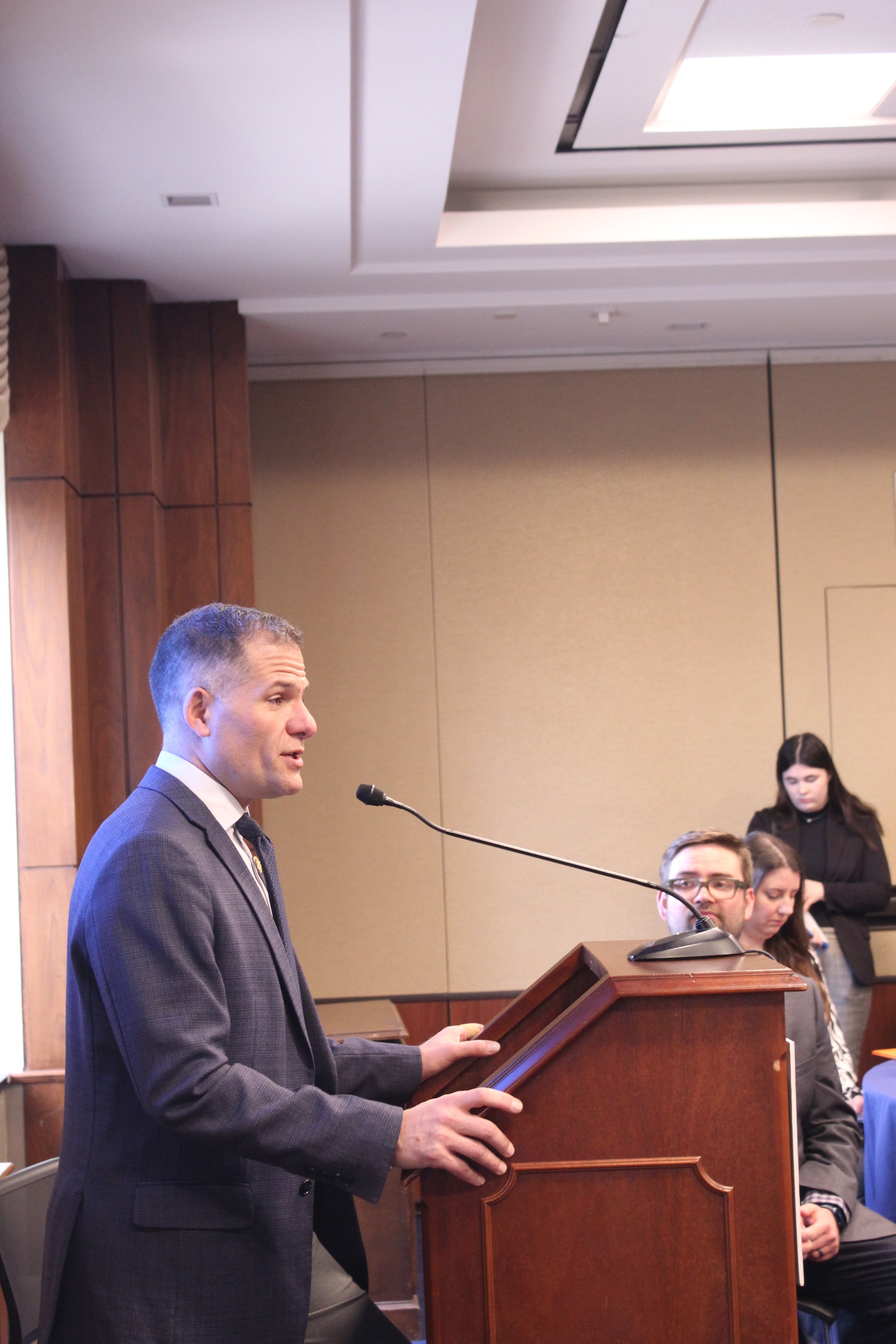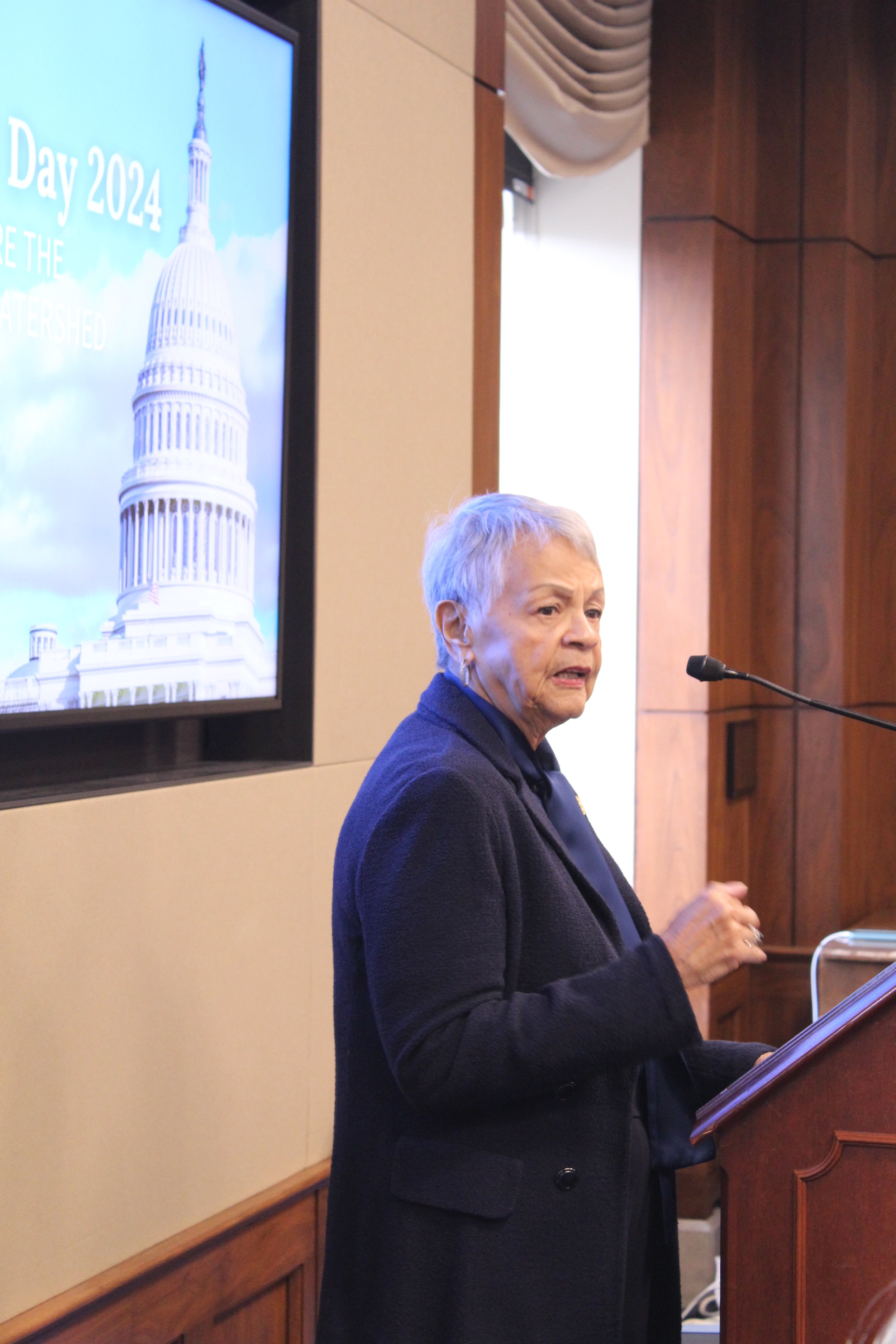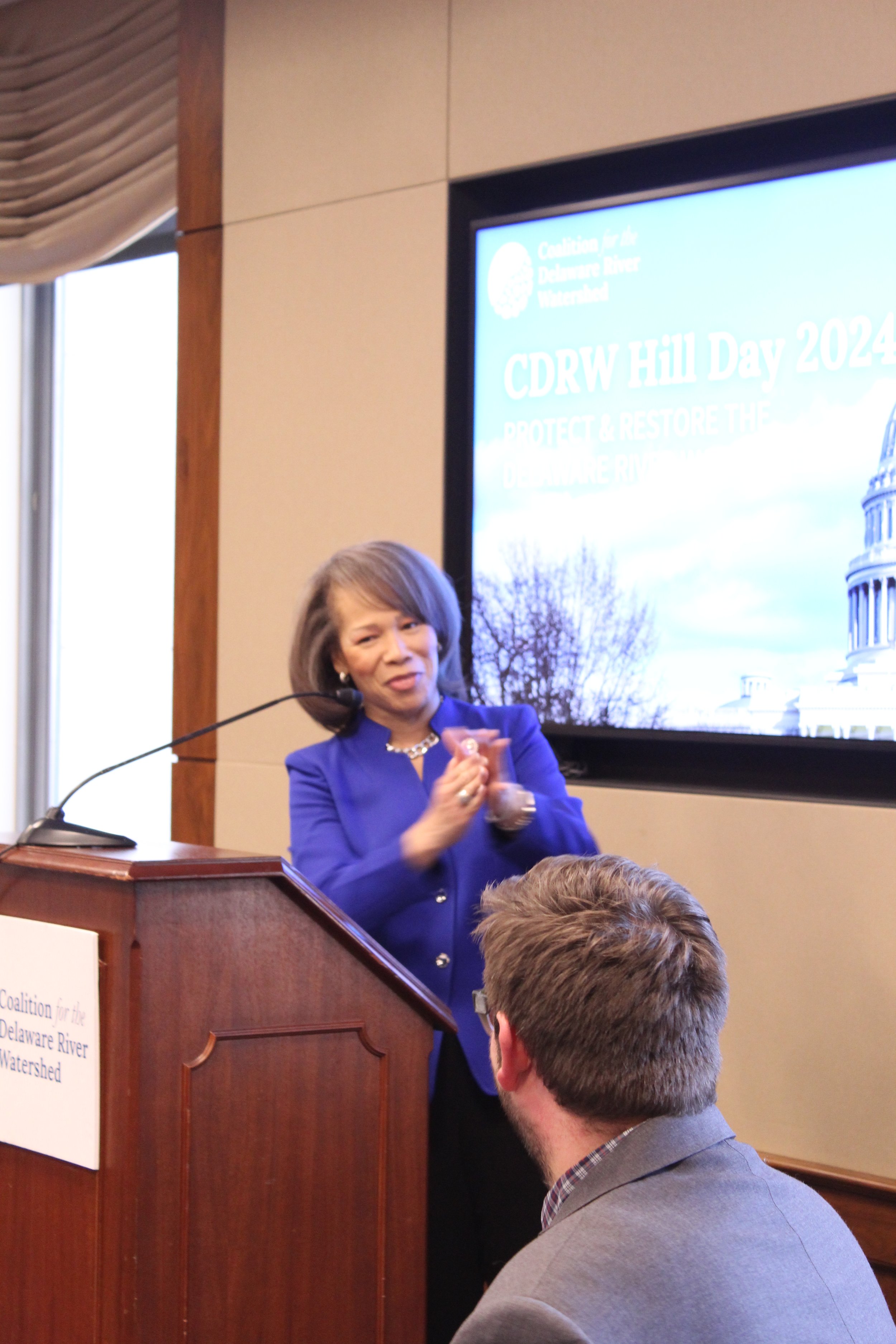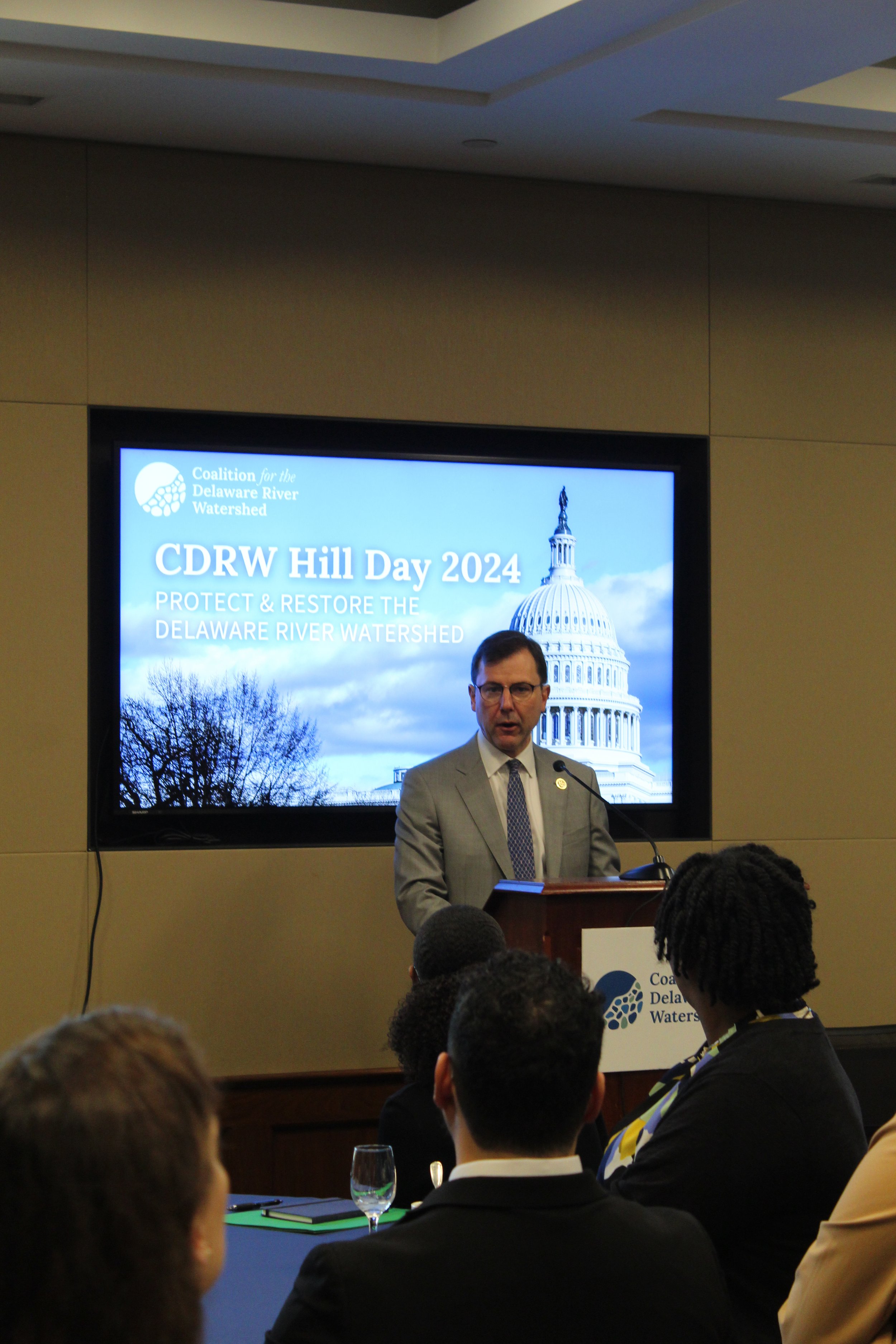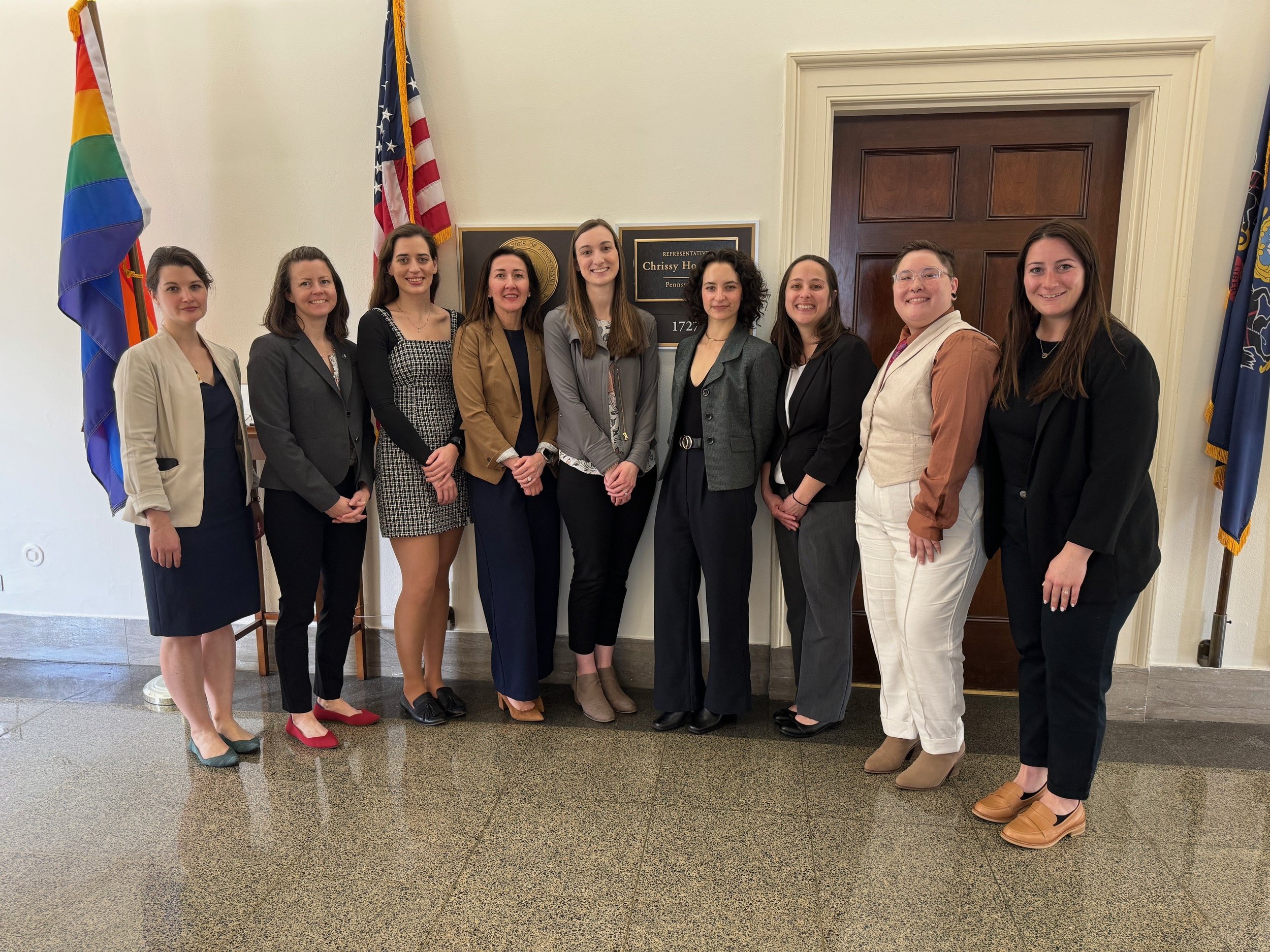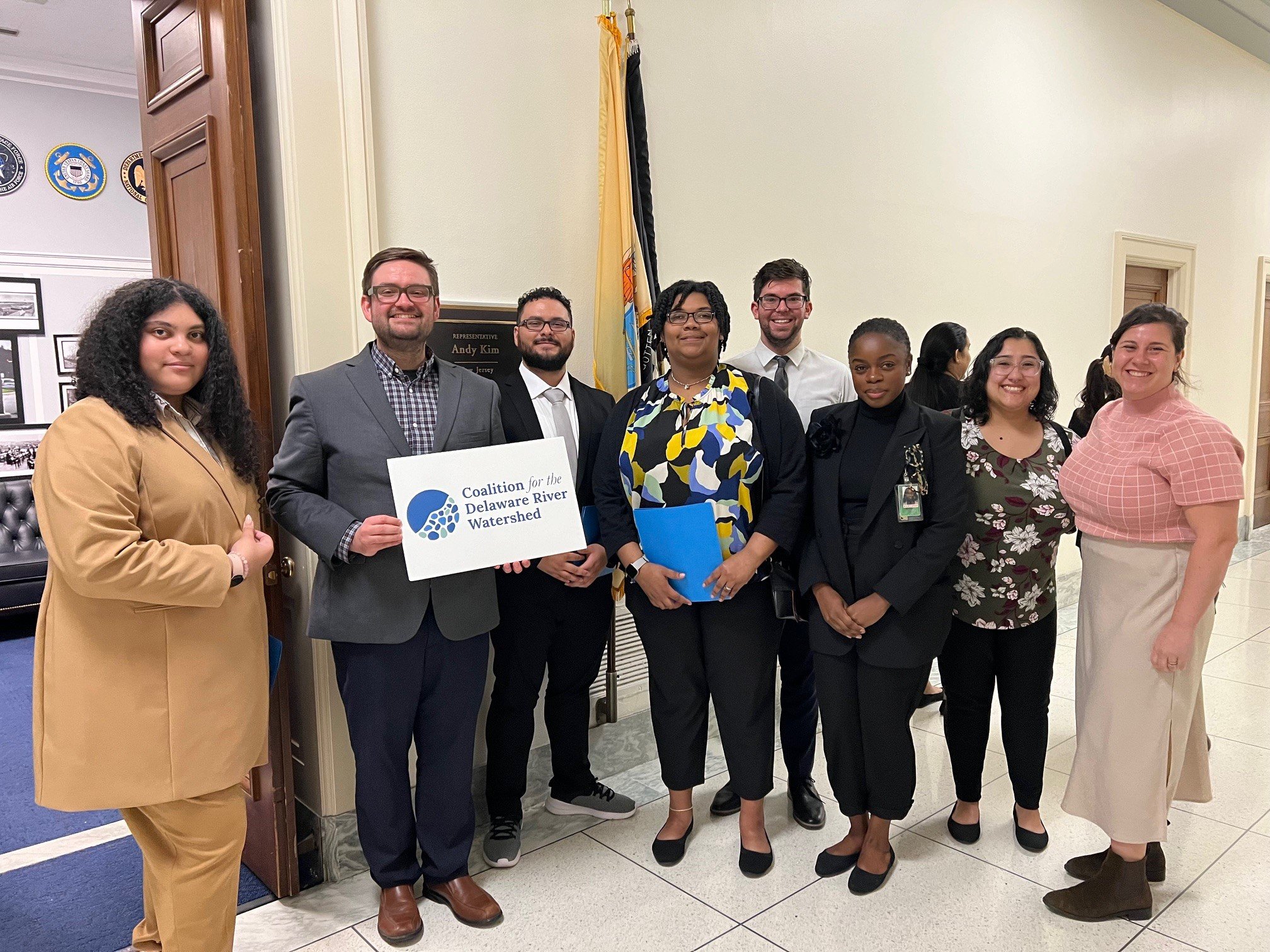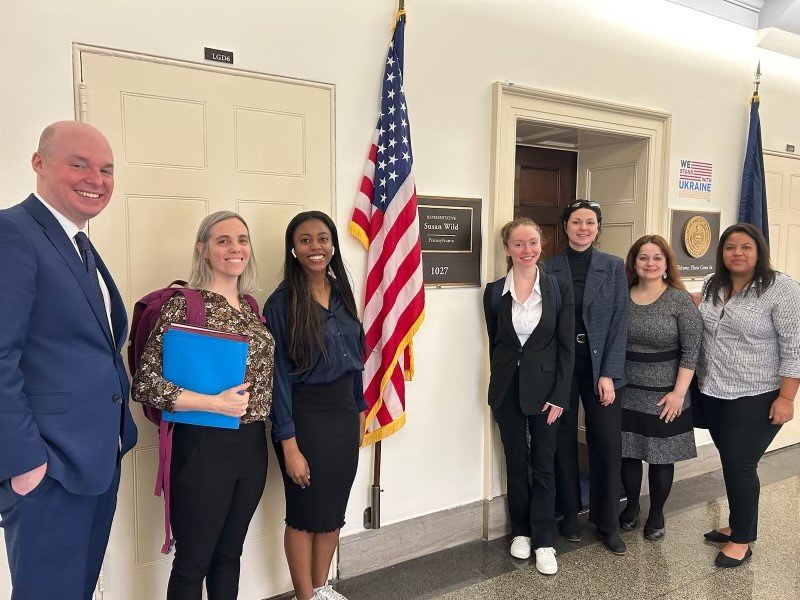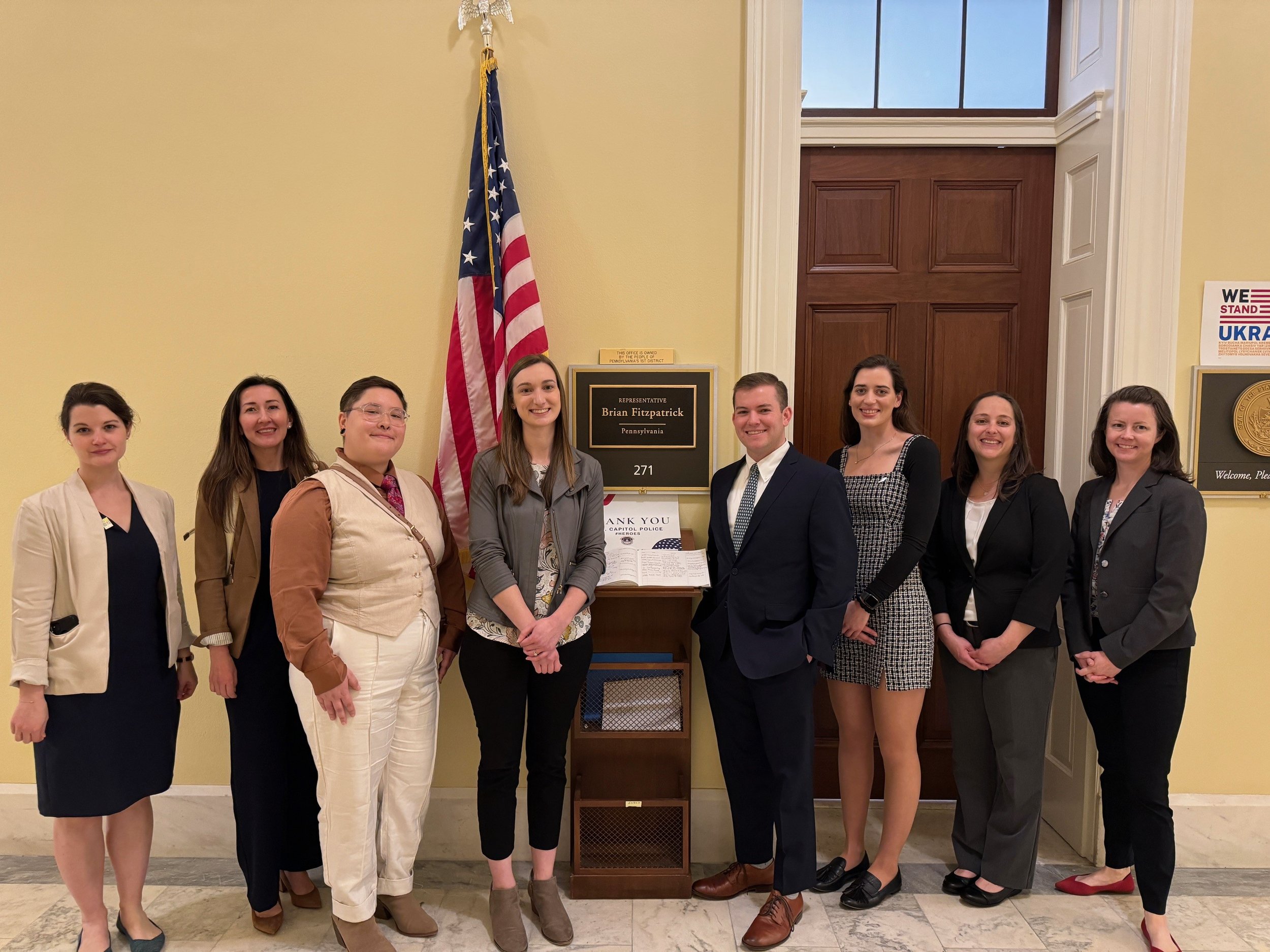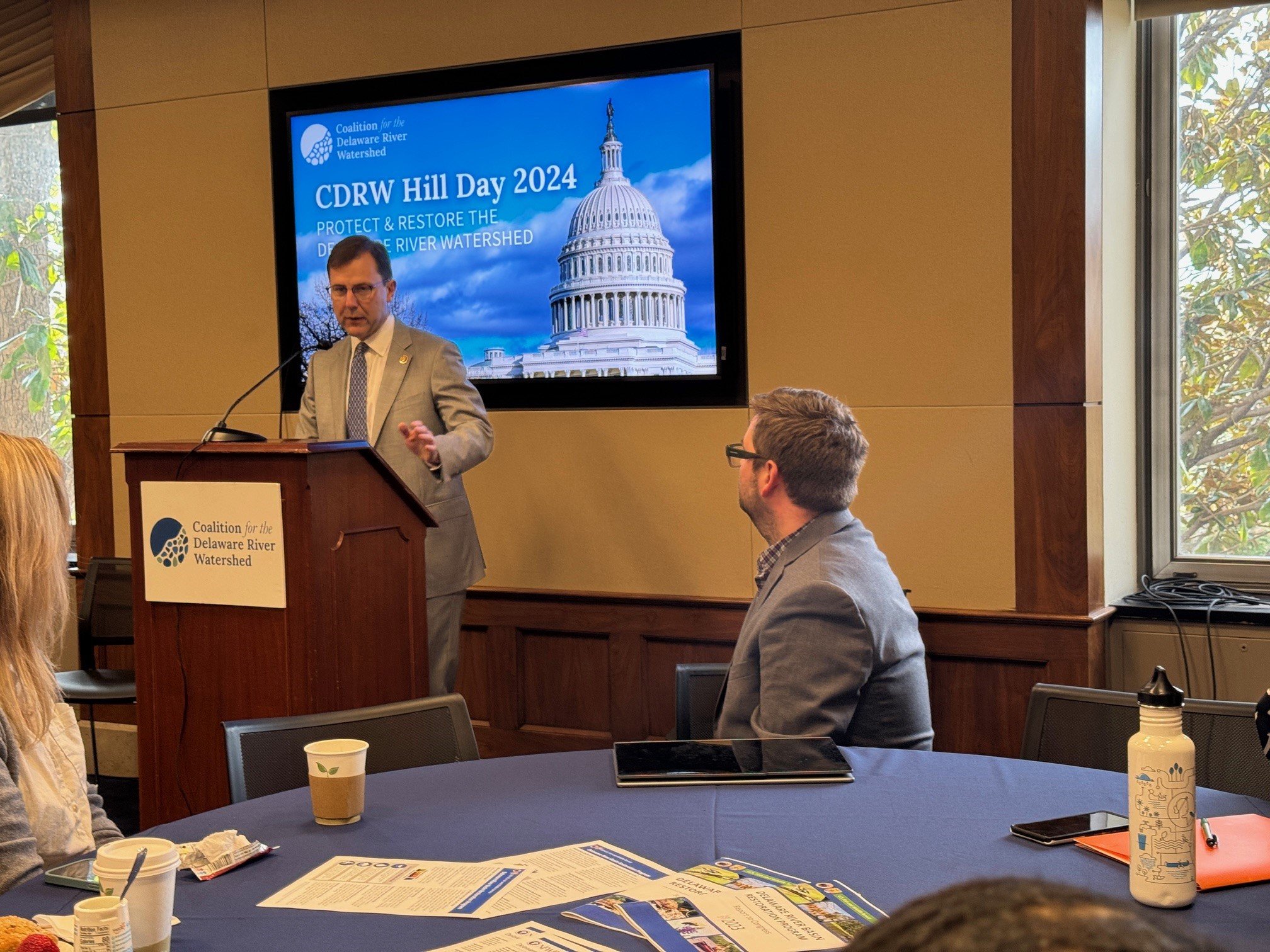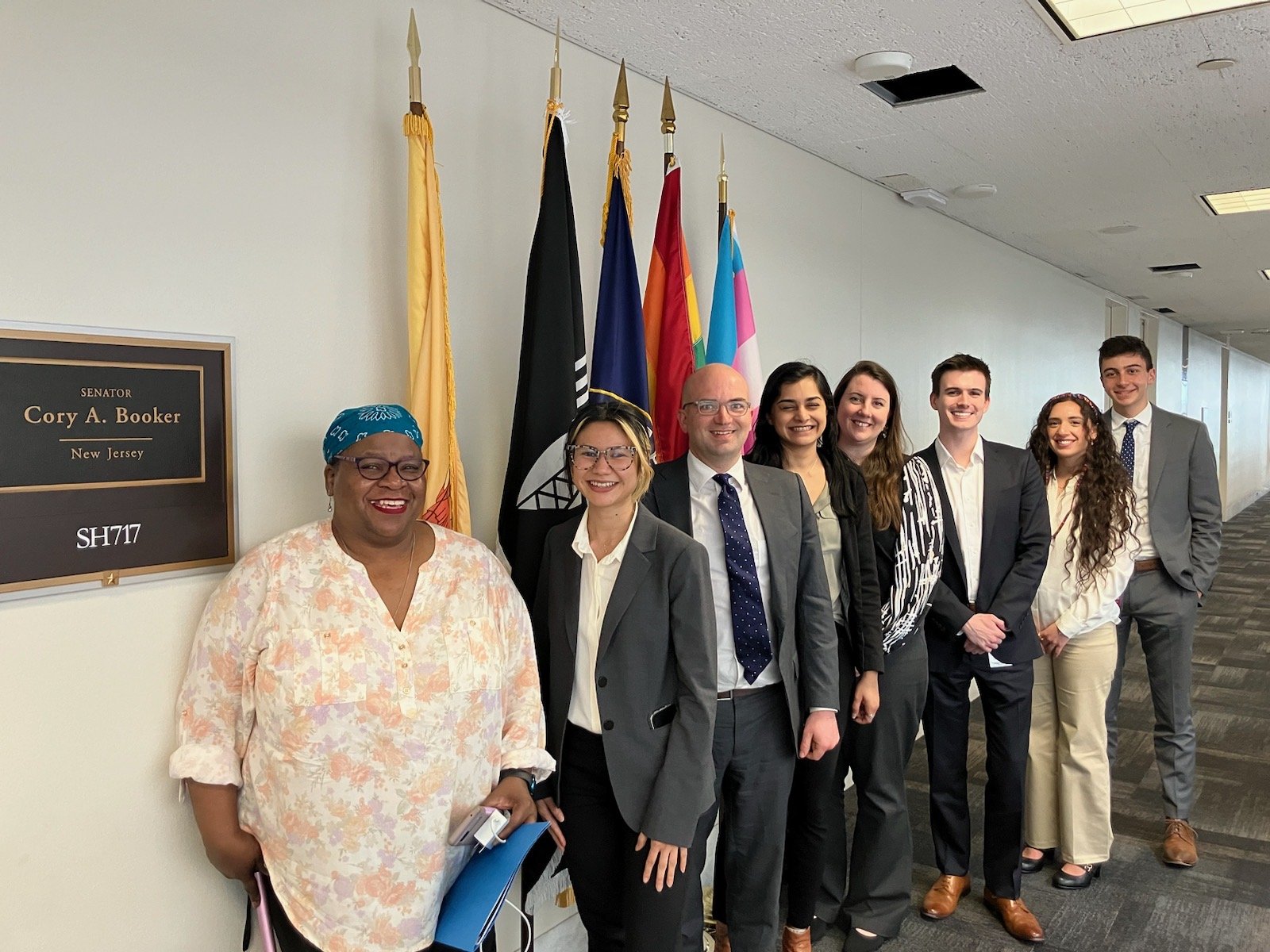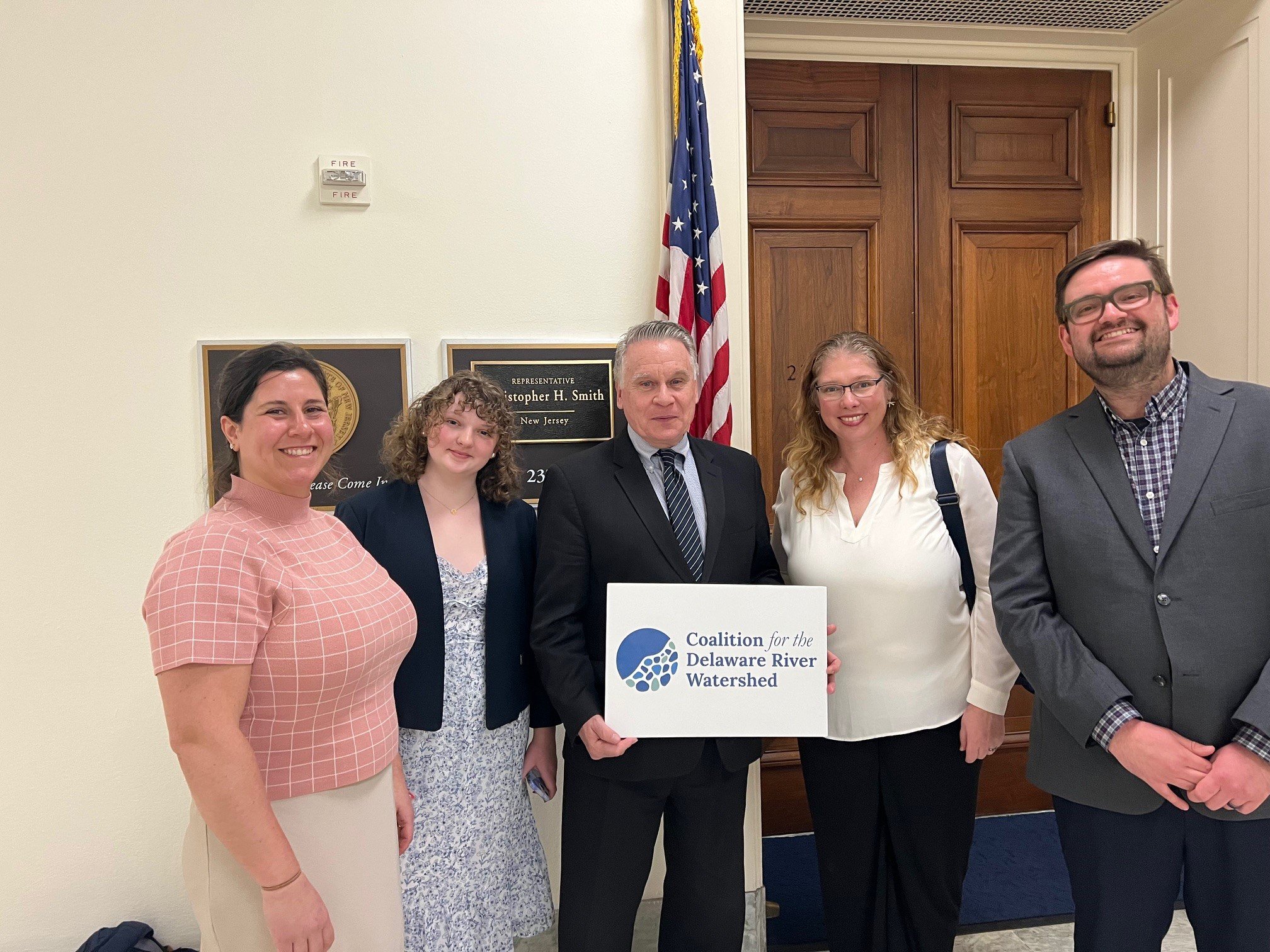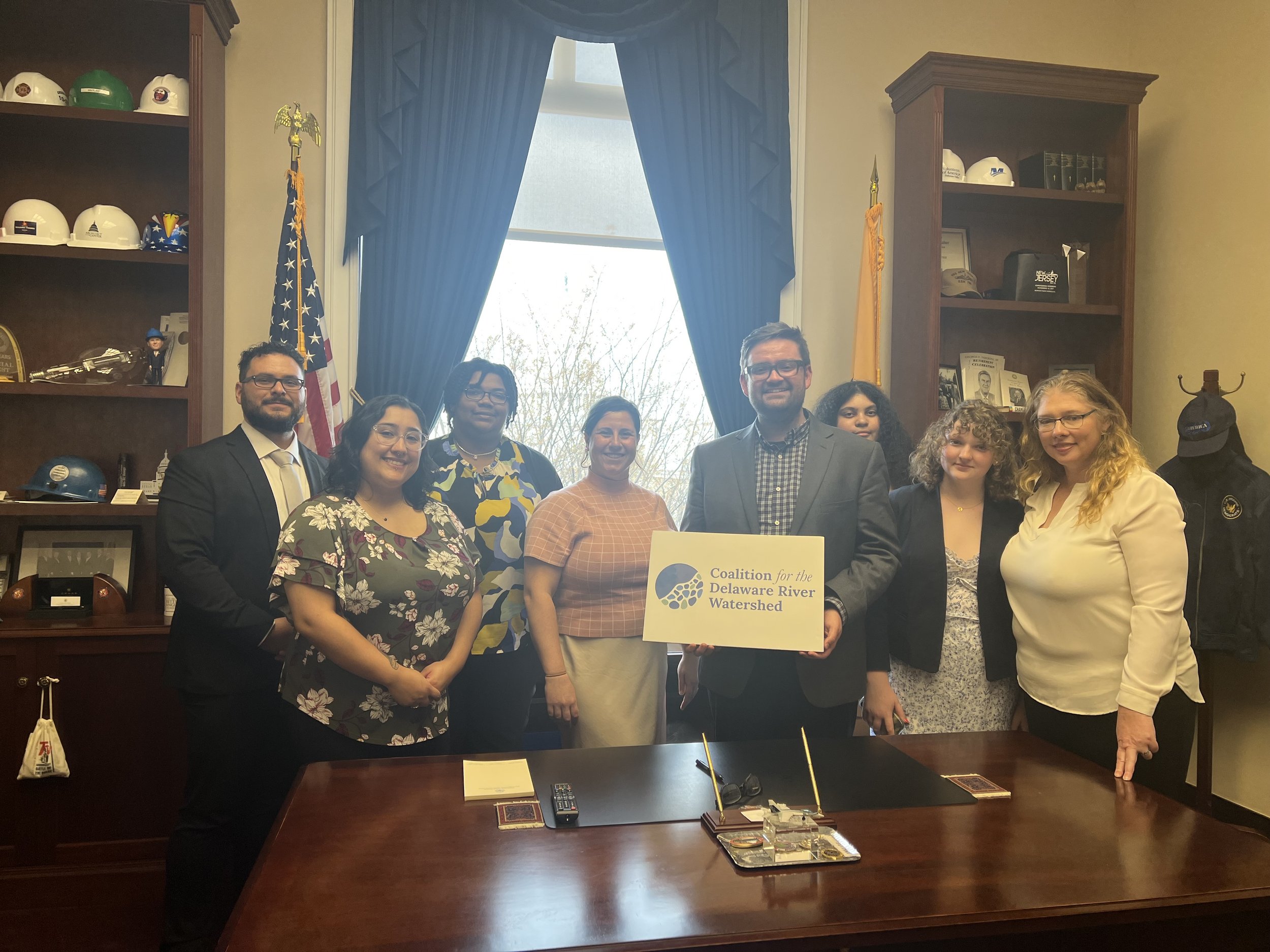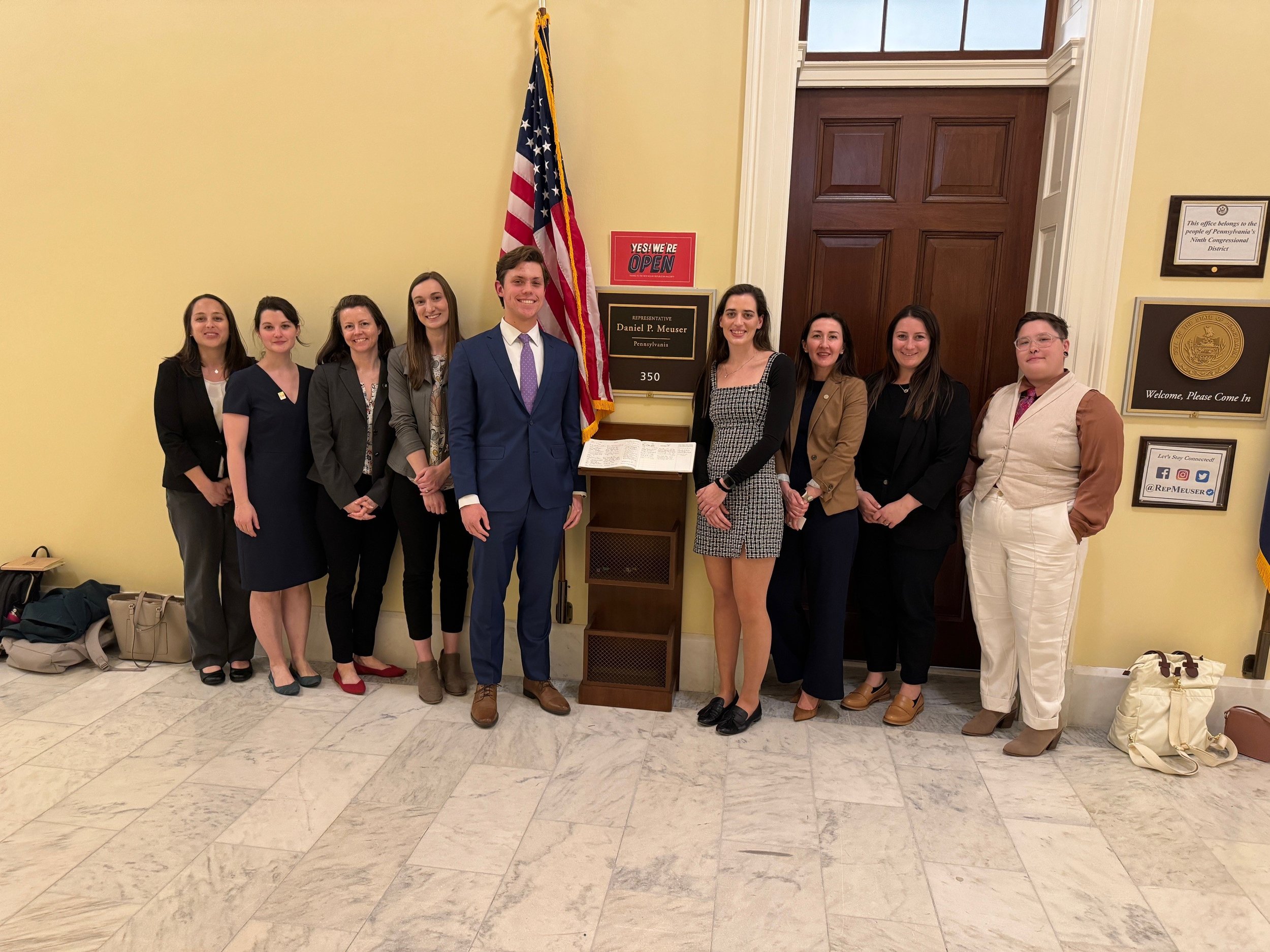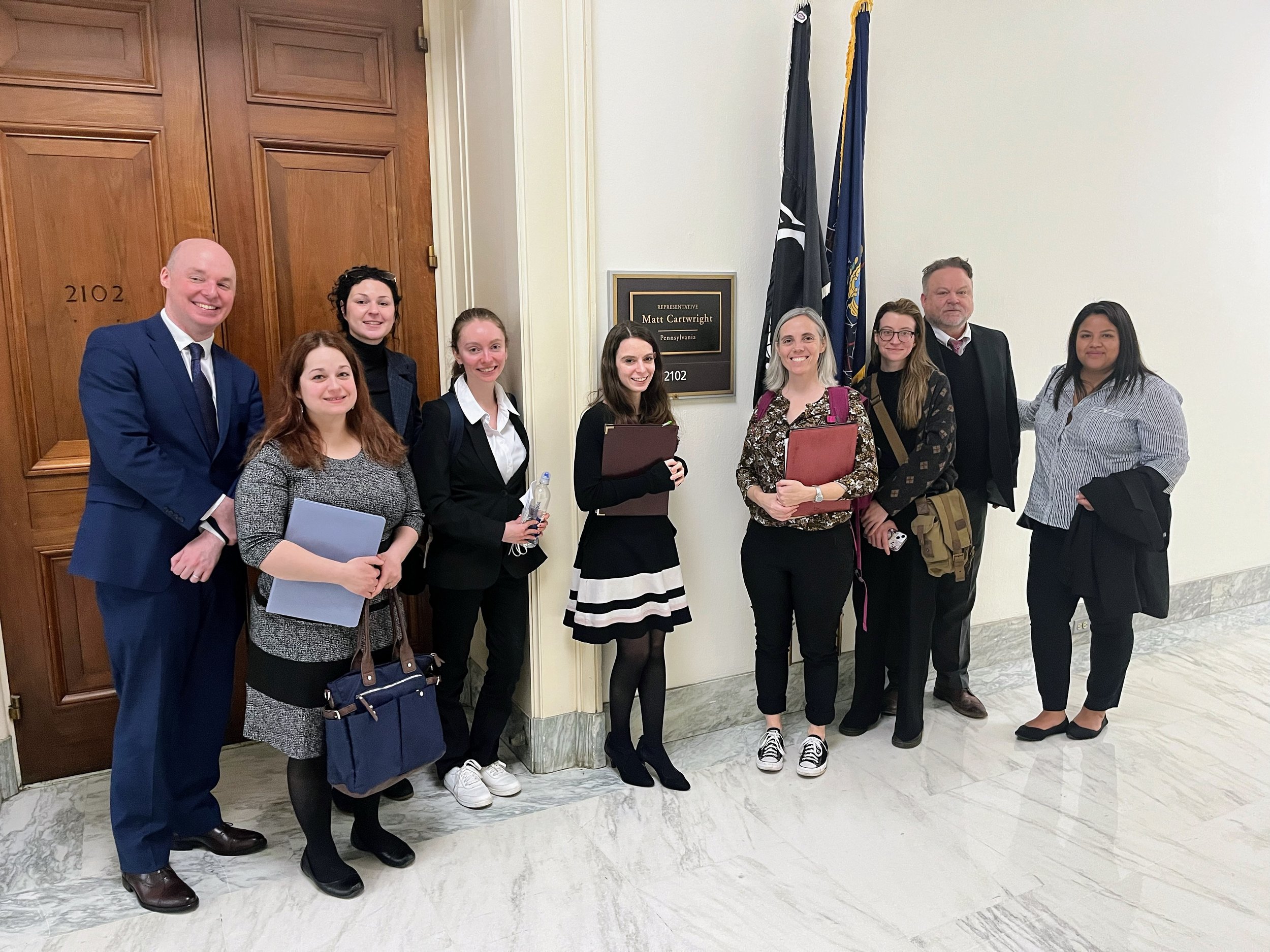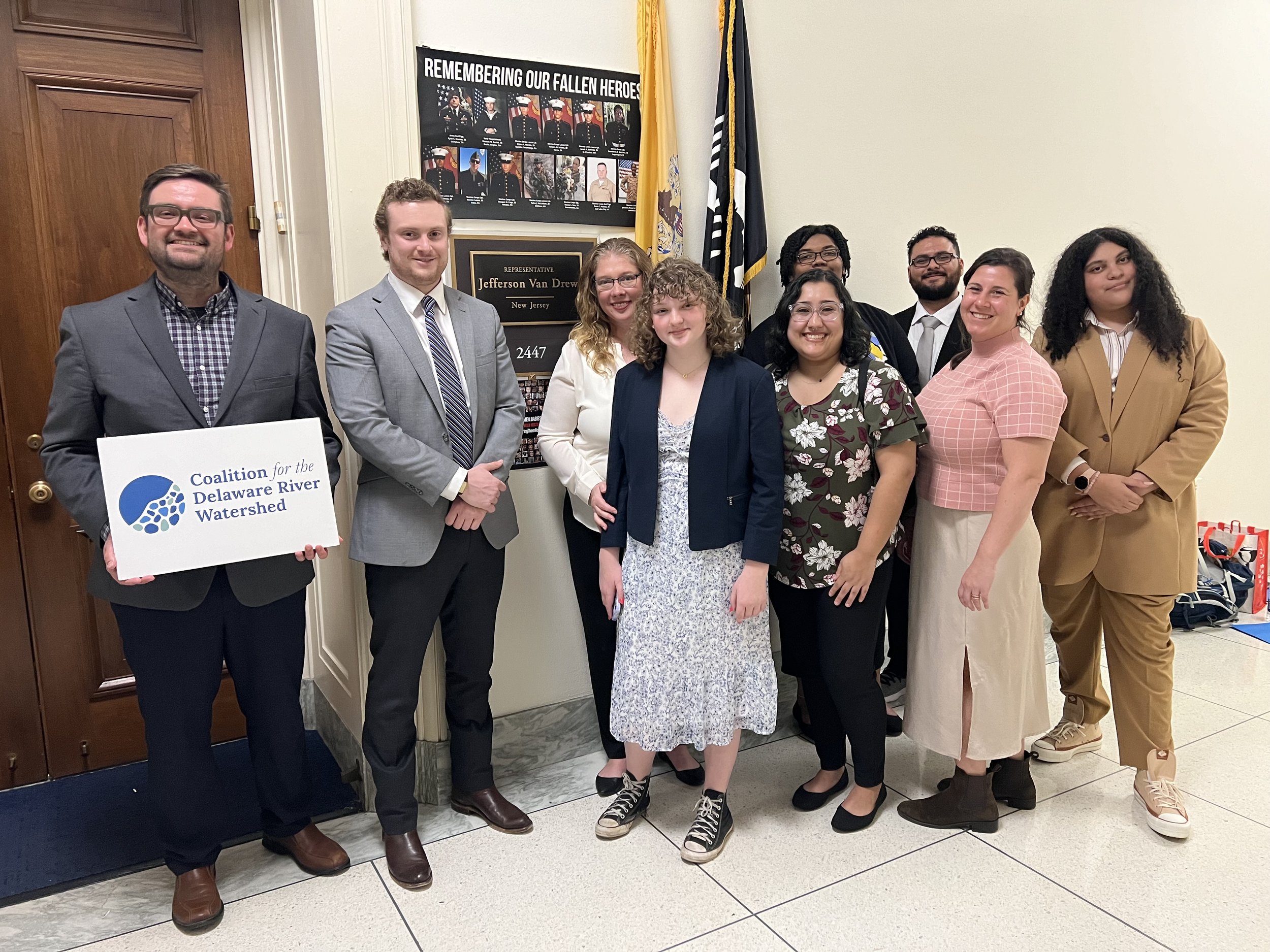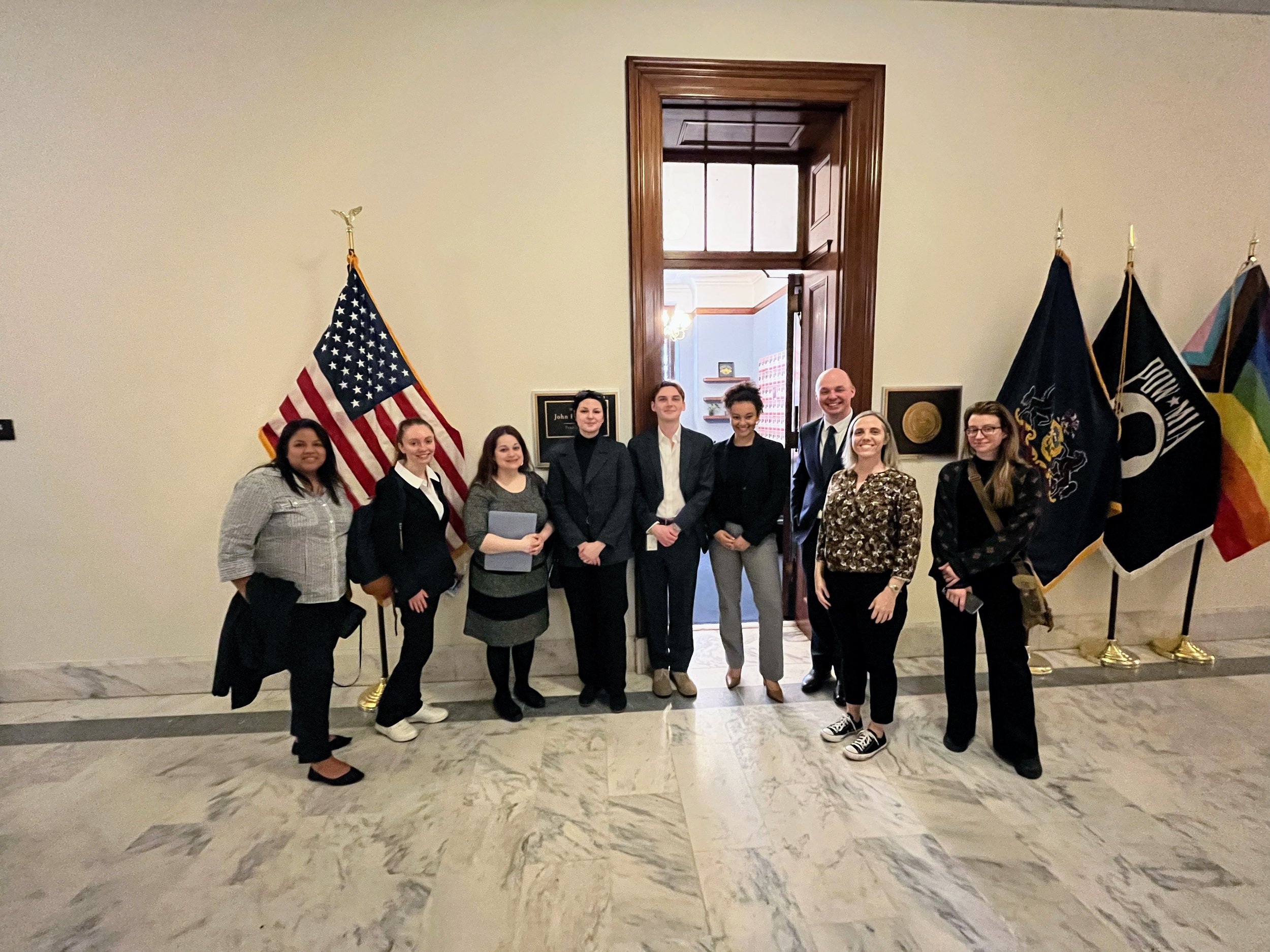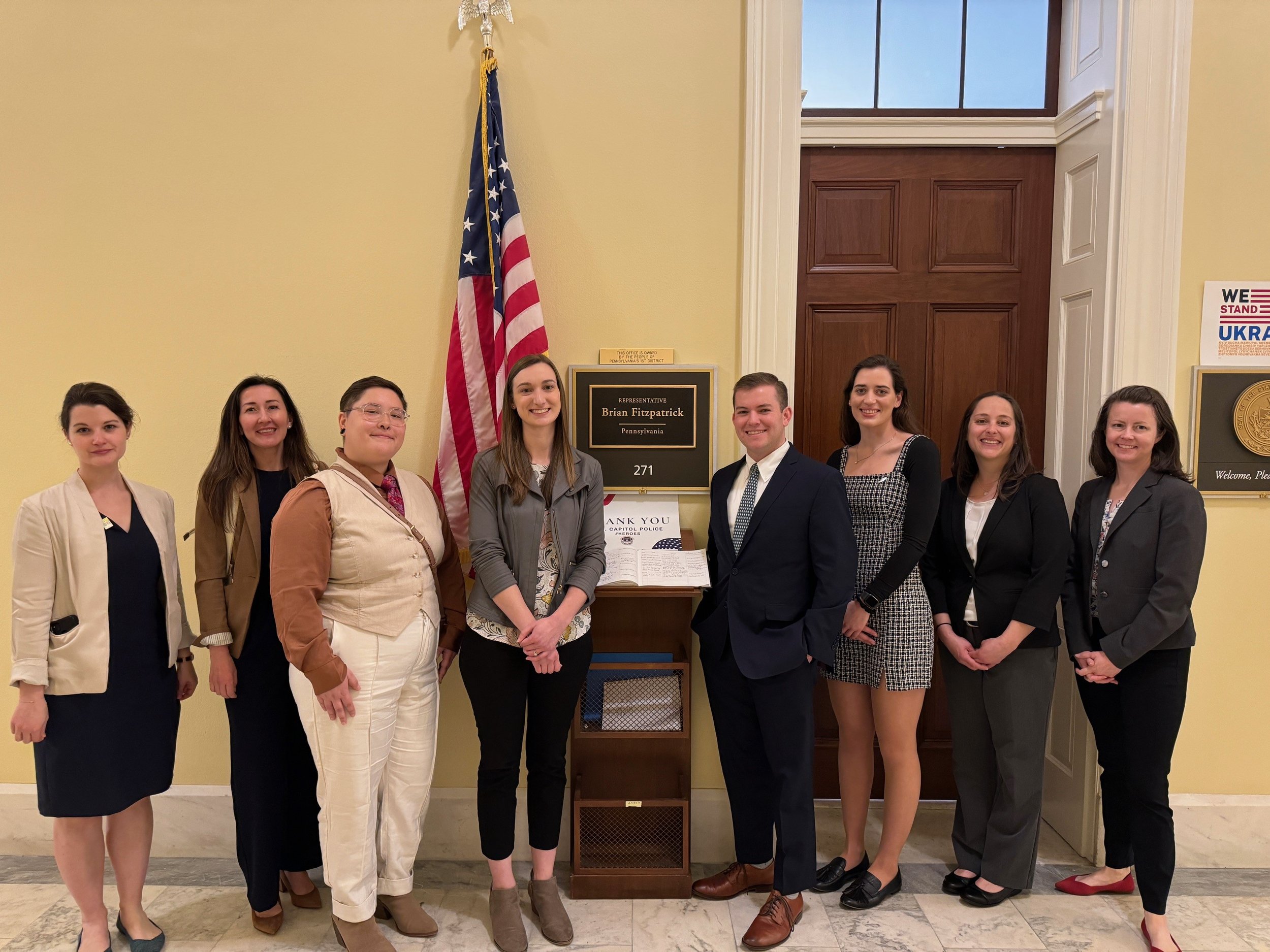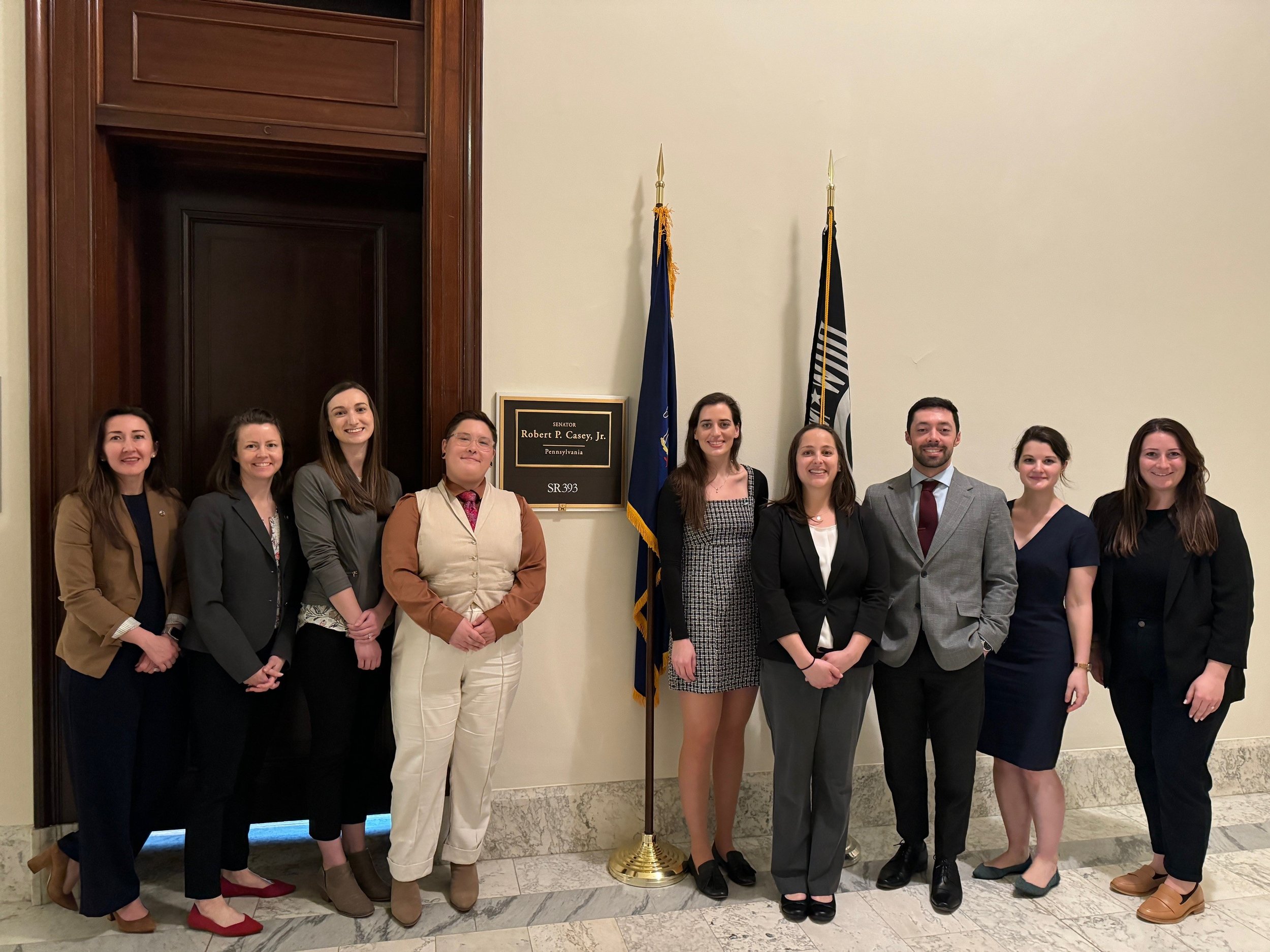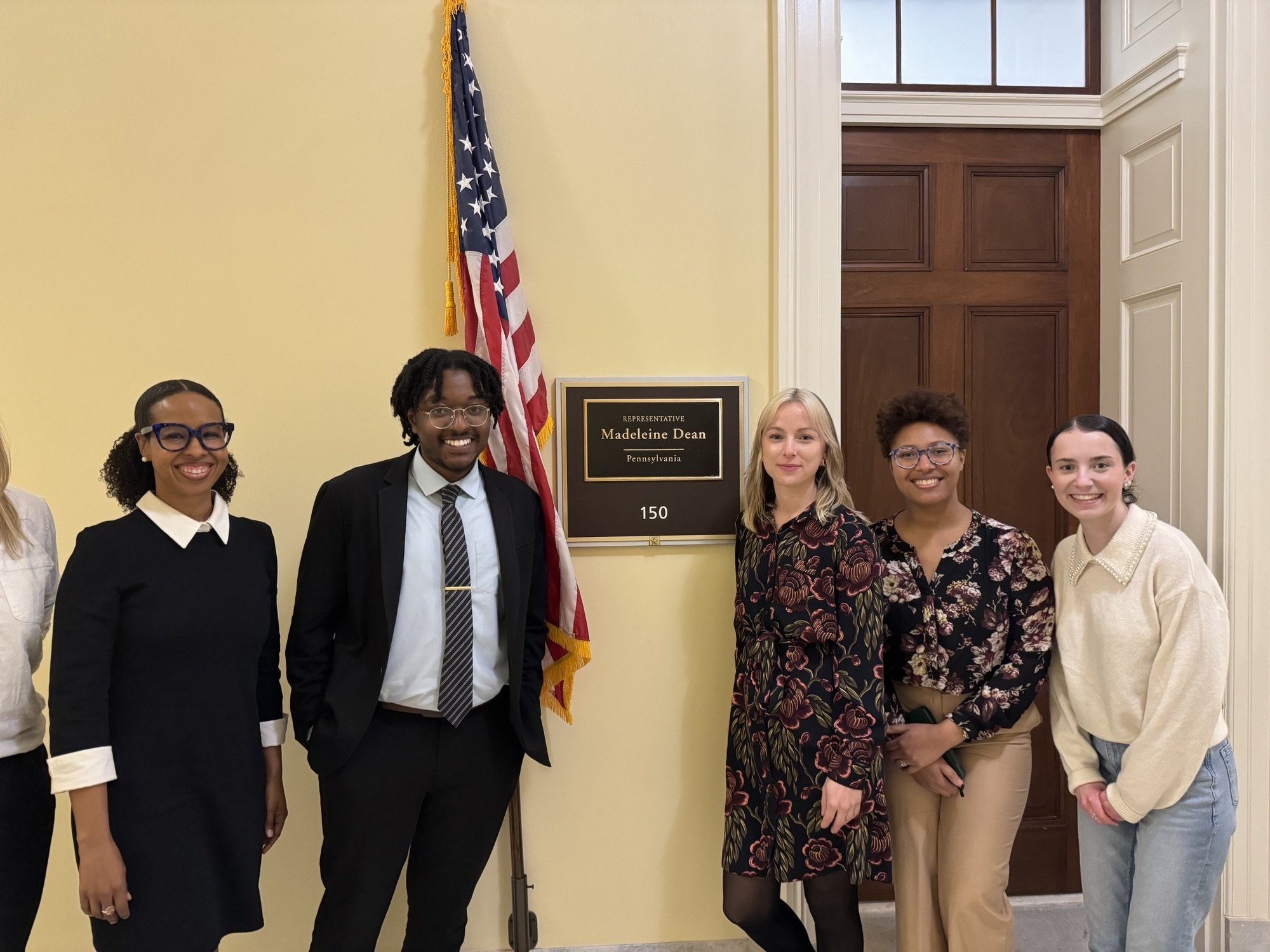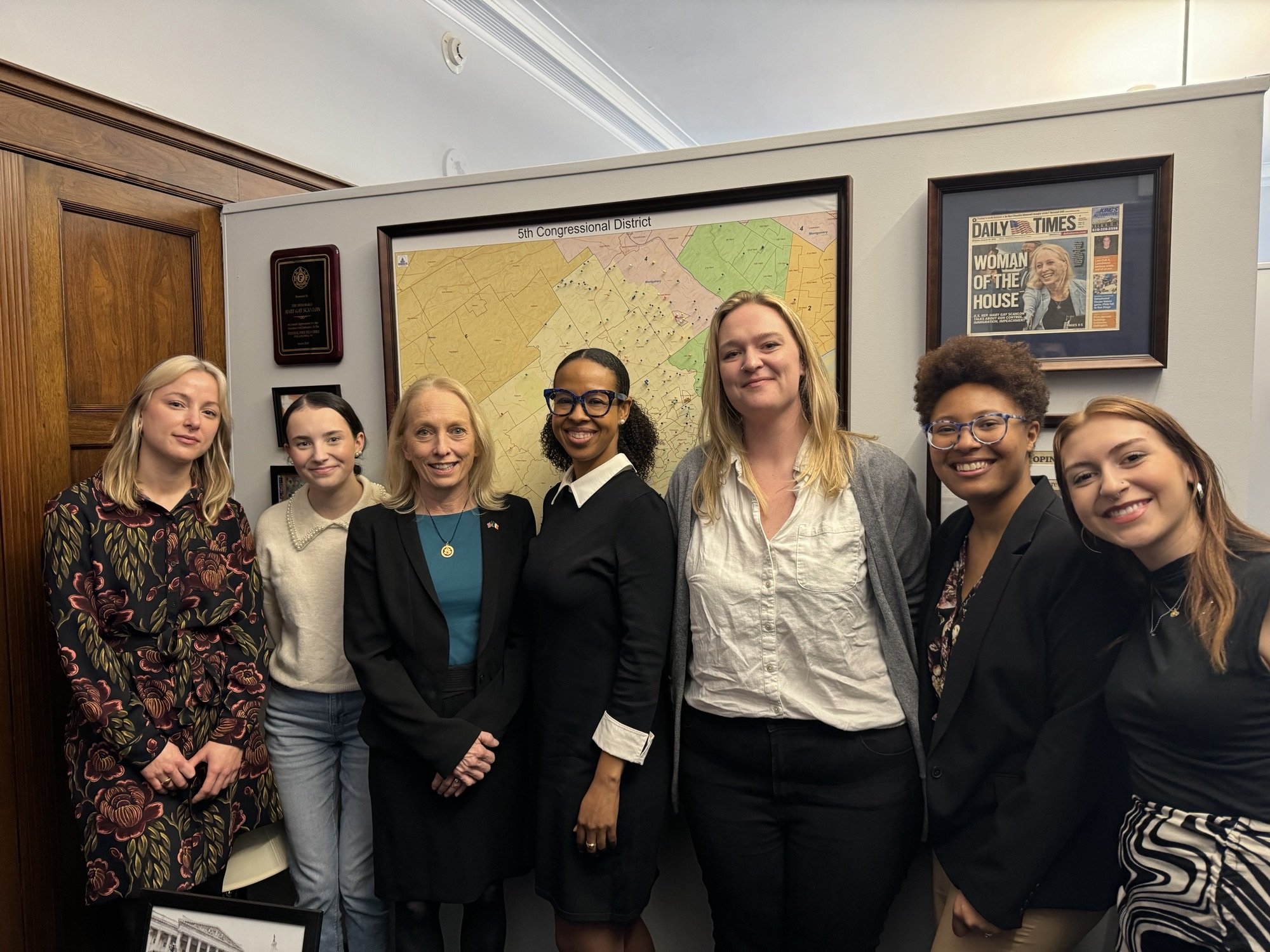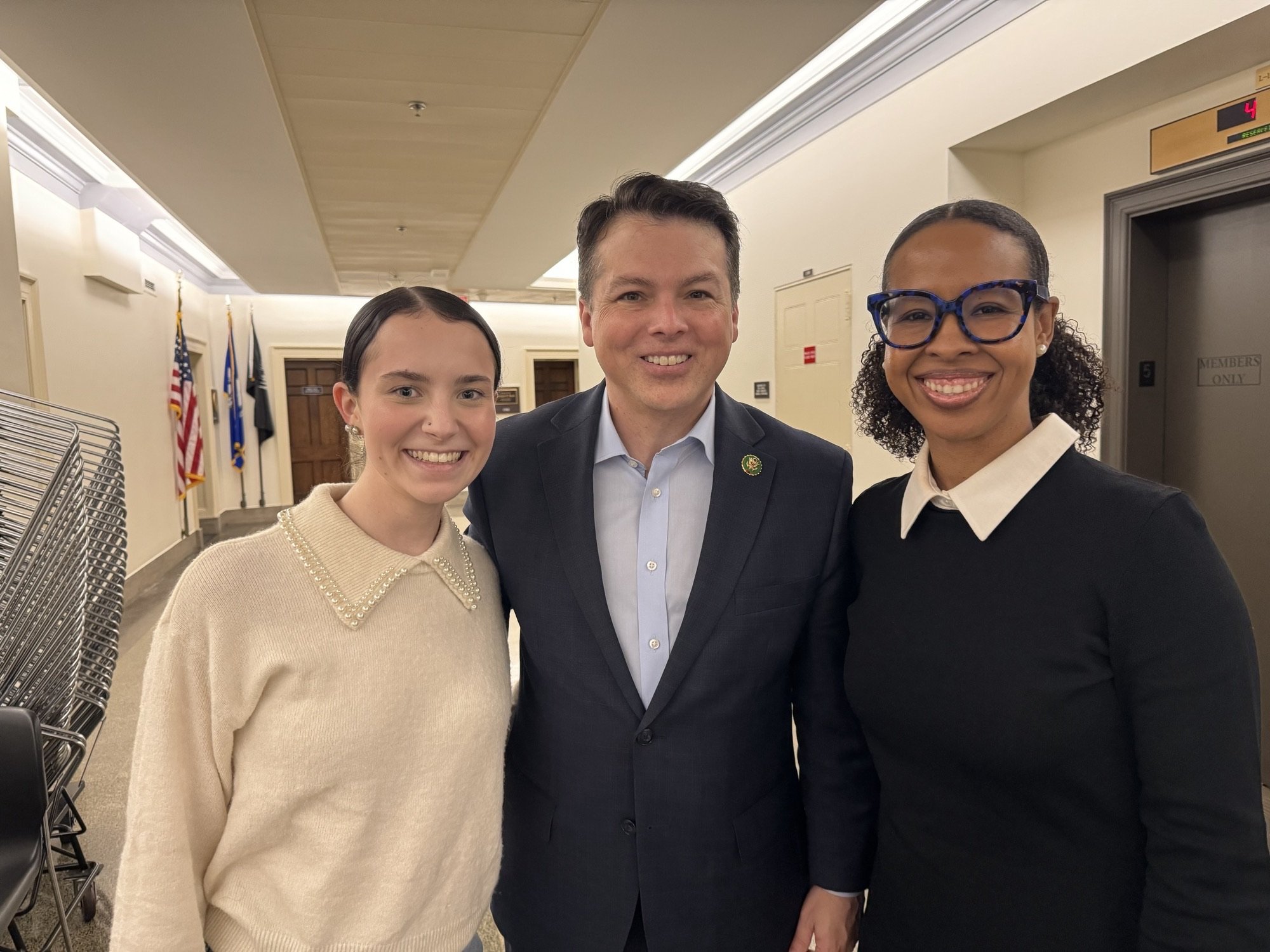March 13th, nearly 60 members of the Coalition for the Delaware River Watershed met in-person with Members of Congress in Washington, DC for our eleventh annual Hill Day to educate offices on key policy and funding priorities that support conservation and restoration in New York, New Jersey, Pennsylvania, and Delaware.
Kelly Knutson addressing Hill Day participants alongside Congresswoman Blunt Rochester
We kicked-off Hill Day with the Congressional Delaware River Watershed Caucus breakfast, where we heard remarks from the Caucus co-chair, Congresswoman Lisa Blunt-Rochester (DE- At-Large), as well as remarks from Congressman Tom Kean Jr. (NJ-7), Congressman Matt Cartwright (PA-8), and Congressman Marc Molinaro (NY-19), highlighting the importance of investing in our critical natural resource, the Delaware River Watershed. The breakfast also featured two Delaware Watershed Fund grantees, Ducks Unlimited and Friends of the Upper Delaware River, showcasing the on-the-ground restoration projects that are protecting and restoring parts of the Delaware River Watershed.
Following the convening, Coalition members met with all basin congressional offices from New York, New Jersey, Pennsylvania, and Delaware to discuss the following appropriation requests and legislative asks:
Fiscal Year 2025 Appropriation Requests
Support for an increase for the Delaware River Basin Restoration Program in the amount of $17 million
The Delaware River Basin Conservation Act has catalyzed the creation of the Delaware River Basin Restoration Program, a collaborative endeavor administered by the U.S. Fish and Wildlife Service. At its core, the program revolves around competitive grants administered through the Delaware Watershed Conservation Fund. Since its inception in 2018, this fund has supported 195 projects with over $55 million in federal funding while catalyzing nearly $80 million in non-federal contributions. However, the demand for restoration efforts across the watershed far surpasses current resources, as evidenced by the overwhelming response to grant solicitations. In FY23 alone, the National Fish and Wildlife Foundation, overseeing the grant program, fielded 64 proposals totaling $26.7 million, underscoring the urgent need for expanded funding.
These projects encompass a wide spectrum of initiatives, from enhancing public access to recreational spaces to safeguarding vulnerable wildlife habitats and preserving critical riparian, stream, and wetland ecosystems. To sustain the remarkable success of this program and combat the threats looming over the watershed's future, we advocate for a significant increase in funding to $17 million for FY25. Despite commendable past funding levels, the escalating demands of conservation and restoration within the basin necessitate a renewed commitment to ensure the long-term health and resilience of the Delaware River Basin for generations to come. Increased funding would provide additional help improving public access and recreation, restoring and preserving fish and wildlife habitat, and protecting riparian, stream, and wetland habitats.
Take action today and ask your member of Congress to support $17 million for the Delaware River Basin Restoration Program. Click the button below to have your voice heard.
Legislative Requests
Cosponsor the Reauthorization of the Delaware River Basin Conservation Act (S.654/H.R.1395)
Introduced by Representative Brian Fitzpatrick (R-PA) in the House and Senator Tom Carper (D-DE) in the Senate, reauthorization of this critical and well-established federal program would continue to affirm the nationally and historically significant Delaware River Watershed as a resource worth protecting. If passed, the program and restoration successes would continue through 2030. To make the program accessible to a wider array of prospective grantees, reauthorization would allow a 90% federal investment with 10% match for small, rural, or disadvantaged communities and the Secretary may waive all match requirements at their own discretion.
Cosponsor Recovering America’s Wildlife Act (RAWA) (S.1149)
The Recovering America’s Wildlife Act is a bold, bipartisan solution that will help protect at-risk species with cost-effective, collaborative conservation programs. If passed, RAWA would invest $1.4 billion annually to national conservation efforts to help at-risk wildlife species and to support critical habitat restoration projects. $75 - $100 million funding is anticipated for Delaware River watershed states. This increased funding is vital to meet the needs of the more than 12,000 species state fish and wildlife agencies have identified as being in need of proactive conservation efforts. That includes more than 1,600 species listed as threatened or endangered under the Endangered Species Act. In addition, RAWA would make a long-overdue $97.5 million annual investment in Tribal Nations. Tribal Nations own or influence the management of an estimated 140 million acres and these lands provide habitat for more than 525 threatened and endangered species. These funds will help Tribal Nations build capacity to implement their own conservation solutions.
Cosponsor the Outdoors for All Act (S.448/H.R.1065)
A bipartisan effort led by Senators Alex Padilla (D-CA) and Susan Collins (R-ME) in the Senate, along with Representatives Nanette Barragán (D-CA) and Mike Tuner (R-OH-10) in the House, aims to revolutionize outdoor recreational opportunities in urban and low-income communities nationwide.
The proposed legislation, known as the Outdoors for All Act, seeks to formalize the Outdoor Recreation Legacy Partnership (ORLP) program, a facet of the Land and Water Conservation Fund (LWCF), which has been instrumental in offering competitive grants for park and outdoor recreation projects in historically disadvantaged areas.
It's a fact that millions of Americans, including children, lack access to parks within a reasonable distance from their homes, especially in lower-income and minority communities where parks are often smaller and less equipped. The Outdoors for All Act addresses this issue by expanding eligibility for ORLP grants and lowering the population threshold to 25,000, allowing more cities and municipalities to undertake park projects. Additionally, the legislation facilitates direct access to LWCF funds for tribes and tribal communities, streamlining the application process. Notably, the Senate version of the bill includes a provision for communities to apply for waivers of non-federal match funding, easing financial burdens on under-resourced areas. This legislation marks a crucial step towards fostering equitable access to outdoor spaces and promoting the myriad of physical and mental health benefits associated with outdoor recreation.
Cosponsor the Ensure Funding for Our Environment Act (H.R. 7204)
Proposed by Congressman Marc Molinaro (R-NY), a new bill is set to reshape the Federal representation within the Mid-Atlantic's three river basin commissions: the Susquehanna River Basin Commission, the Interstate Commission on the Potomac River Basin, and the Delaware River Basin Commission. This legislation seeks to replace the current Federal representative from the U.S. Army Corps of Engineers with the U.S. Environmental Protection Agency, aiming to enhance environmental oversight and management. Alongside this change, any Federal funding for these commissions would be rerouted through the Interior and Environment Appropriation Bill rather than the Energy and Water bill.
Notably, the Delaware River Basin Commission (DRBC) plays a pivotal role in managing a vital river system that serves as a water source for over 14 million people, supports economic activities, and sustains wildlife habitats. Its programs range from water quality protection to drought management and watershed planning. Despite funding lapses, the DRBC has achieved significant milestones in water quality, including a 76 percent reduction in PCB discharges and improvements in dissolved oxygen levels, leading to economic development and the restoration of aquatic species. Moreover, the commission has been proactive in addressing emerging concerns like PFAS contamination and safeguarding drinking water intakes from salty ocean water intrusion, showcasing its commitment to environmental stewardship and public health.
The Coalition for the Delaware River Watershed is thankful for the participation of Coalition member organizations, Members of Congress, Congressional staffers, and the constituents that made this year’s Hill Day possible! It was great to be back in Washington, DC to advocate for the significance of clean water, environmental justice, wildlife conservation, habitat protection, land preservation, and recreation- another stride towards a healthier and stronger Delaware River Watershed.



